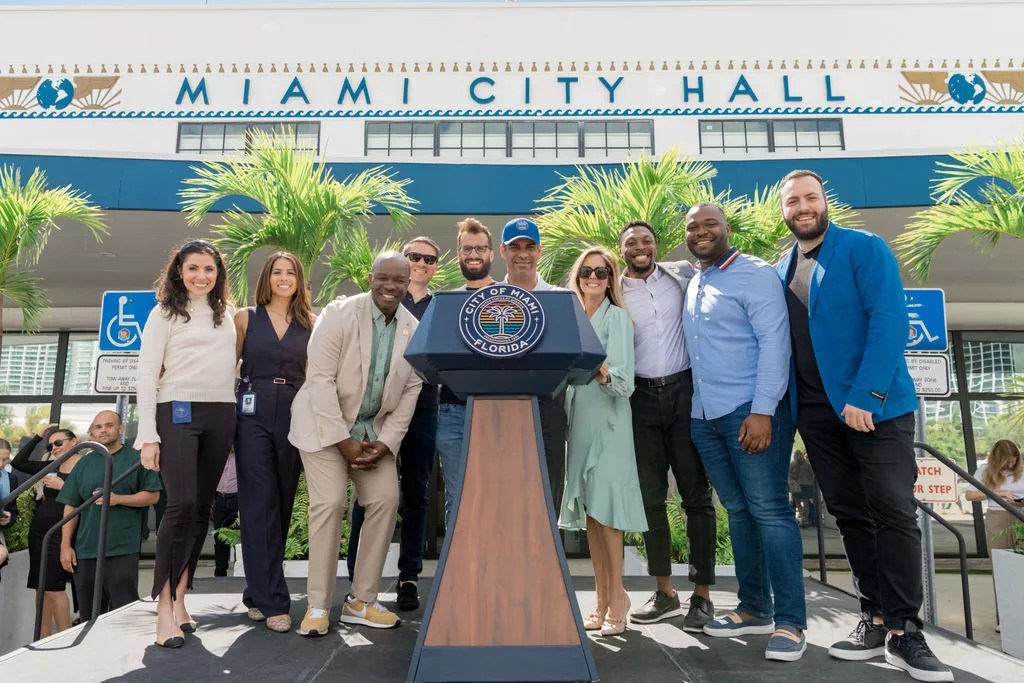
Photo via X/@eidmiami

Audio By Carbonatix
According to the City of Miami’s social media, the city’s Built in Miami program in the spring of 2024 appeared to be a great success in bolstering the city’s tech scene.
The posts highlighted the various workshops and speaker panels with tech founders that the city’s Venture Miami office hosted in partnership with the local nonprofit Miami Hack Week. Photos on the city website give an overview of the nonprofit’s “Builders Collective” space, from workshops on building capital to networking opportunities and tips on how to succeed as a startup.
Over a year after Miami Hack Week hosted the city’s nine-week startup program, Ja’dan Johnson, executive director of Miami Hack Week, says the nonprofit never received the $30,000 the city owed, which he says played a role in his decision to close the nonprofit last year.
Built in Miami, an annual program dedicated to helping South Florida entrepreneurs develop startup ideas into finished products, kicked off in February 2024. Miami Hack Week would host the weekly workshops and speaker events during the nine-week program at its “Builder’s Collective” space in Wynwood.
Erick Gavin, then-executive director of Venture Miami, approached the nonprofit in November 2023 to see if it would be interested in hosting the program. Miami Mayor Francis Suarez started Venture Miami in January 2021 to help transform the city into a global tech hub.
“I hope that everything is going well,” Gavin wrote in an email. “We have started the process of planning the Built in Miami program for ’24 and wanted to gauge interest on Builder’s Collective being the space to operate the program.”
Following initial discussions, a month later, a staffer from Venture Miami sent over the estimated budget proposal, which allocated $30,000 for “Facilities and Equipment” to the nonprofit.
The city’s email reads, “Let’s set up a meeting for next week to finalize it.”
Johnson followed up in the new year to get the contract process going. Yet the city hadn’t finalized the agreement by the time the program began. He says he wasn’t concerned, given the nonprofit’s existing relationship with the city. The group had hosted Miami Hack Week, a week-long event funded by a $25,000 city grant to attract software engineers to Miami, since 2021. In the meantime, the nonprofit received an advance from its fiscal sponsor to cover the costs for Built in Miami. There had not been any previous payment issues, Johnson notes.
Nearly halfway through the nine-week program, Johnson followed up with the city about the status of the agreement. City staff assured him that it was processing the formal agreement, which would be finalized by the time the program was completed.
“Hi Erick & team, just wanted to get email thread going here to better understand next steps around timeline and payments for the Built in Miami program at our space in Wynwood,” Johnson wrote in a March 2024 email. “We are almost halfway through the program and have not entered into a formal agreement. We incur weekly operational costs to execute the program, and this is becoming way more onerous than anticipated.”
He added, “As you all are very aware, Clara and I are very excited to be partners to the city and facilitate different programs that help to benefit our greater community, but we are also a small nonprofit with minimal resources.”
Gavin reassured Johnson that the process was moving along.
“We are putting the agreement through our risk and routing process on Monday and will give continued updates as we move forward,” Gavin emailed Johnson in March 2023. “We will work to finalize everything in a timely manner, as the agreement was already created from our legal department’s side. Attaching the agreement here to close the loop and will circle back with updates.”
After the program ended in May 2024, Johnson says the city never executed the agreement, and the group never received payment for its services. He adds that, between the city’s promised reimbursements and the $30,000 for the venue, he was left with an outstanding debt of more than $30,000. Johnson tells New Times that he has repeatedly contacted the city, including Mayor Suarez, about the outstanding payment.
“If this can happen to a trusted and established nonprofit partner, what assurance do other small businesses and community organizations have when they enter into partnerships with the city?” Johnson asks. “Our goal is to amicably resolve this matter but also to ensure that no other organization is left in a similar position.”
The city’s Venture Miami office has since dissolved, evolving into the city’s Department of Economic Innovation and Development. Johnson says the new department has declined to honor the payment.
“This is an unfair and significant burden on a small nonprofit dedicated to supporting the community,” Johnson wrote in an email to Keith Carswell, director of the Department of Economic Innovation and Development.
Similarly, another nonprofit had difficulty receiving the money it was promised from the City of Miami. As first reported by New Times, the Black-led Circle of Brotherhood waited nearly two years for a $1 million contribution that Mayor Suarez announced during an event he heavily promoted on his social media. Despite Suarez’s massive check, the city commission still needed to approve the funding from the $137 million it received through the American Rescue Plan Act (ARPA).
Despite quickly approving the pledges to other organizations, commissioners dragged their feet, deferring the Circle of Brotherhood contribution for more than a year. After intense scrutiny and a heated commission meeting, the city finally voted to approve the funding.
The City of Miami had not returned New Times‘ requests for comment by the time of publication.